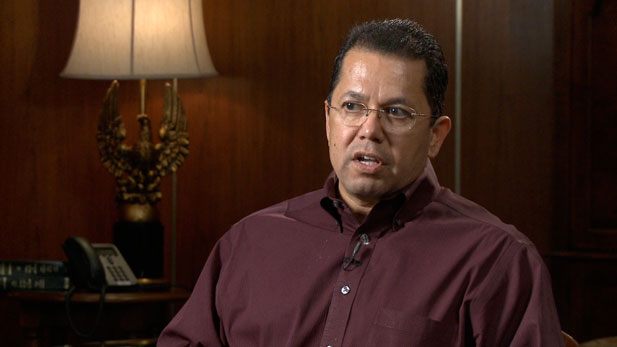 Rep. Richard Miranda, D-Tolleson, says population growth means Latinos should get a chance at greater legislative representation in redistricting.
Rep. Richard Miranda, D-Tolleson, says population growth means Latinos should get a chance at greater legislative representation in redistricting.The Arizona Independent Redistricting Commission should produce its first draft maps within two weeks, triggering a second round of public hearings leading to finalization this fall.
The five-member commission is wrapping up public hearings this week and next, aiming to produce the draft maps as early as Oct. 1, but likely a few days after, commission officials say.
A review of the complex, grueling redistricting process and its status is the topic of Arizona Week Friday evening.
Redistricting commissioners--comprised of a group of independent citizens since 2000, when Arizonans passed a ballot measure meant to take politics and politicians out of the process--are tasked with redrawing the state's political boundaries from scratch, all while meeting population requirements, respecting geographic features, and protecting communities of interest and competitiveness.
"It's a difficult process," Commissioner Scott Freeman said in an Arizona Week interview. "There's a real appreciation on my part for how daunting the task is. I do think there is some pressure the commission feels to get draft maps voted on and out to the public as soon as possible."
Once the maps are out, Freeman said, a 30-day comment period ensues, followed by commission finalization of its maps. They then will be submitted to the U.S. Justice Department to make sure they comply with the federal Voting Rights Act, the first and foremost of six criteria for the redistricting work.
"It's very tough to follow the six constitutional criteria that we have to follow and make these maps work," Freeman said. "It's a really complicated puzzle."
The criteria conflict with one another in some instances but are prioritized in the state constitution and by the dictates of federal law. The Voting Rights Act and the one-person, one-vote rubric take precedence over all else. Creation of competitive districts is last on the list.
Arizona Rep. Richard Miranda, D-Tolleson, said in an interview with Arizona Week that as a member of a coalition of minority group leaders in the state, he is pushing for protection of minority voting rights and their communities of interest over competitiveness.
Miranda said he hopes to see three majority-minority congressional districts formed in the mapping, but said he anticipates there will be two, just as now. On the legislative side, he said, the commission should come up with three majority-minority districts in the Phoenix metropolitan area.
The Latino population deserves that because its growth represented nearly half the state's total population growth in the last decade, Miranda argued.
"Our idea that we are proposing to the commission is that there should be, not two as there really are now, but three majority-minority districts in the Phoenix area," Miranda said.
Reporter Michael Chihak further explores redistricting in the September 23 episode of Arizona Week. Watch it now:

By submitting your comments, you hereby give AZPM the right to post your comments and potentially use them in any other form of media operated by this institution.